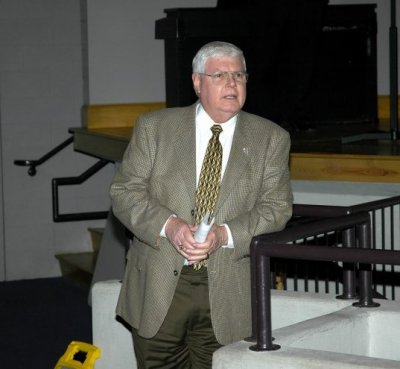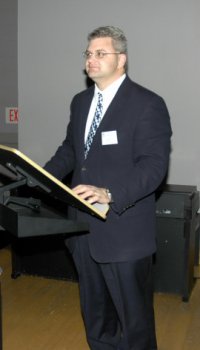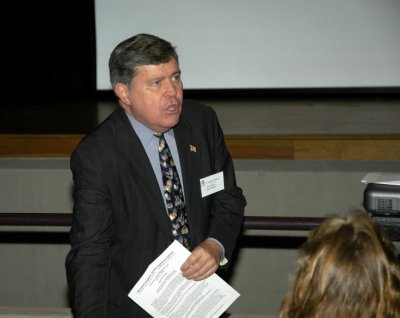
Delegate John F. Wood, Jr. (D) addresses an audience of teachers, administrators, students, and parents seeking state funding for nonpublic schools in Maryland.
By David Noss
LEONARDTOWN, Md. - Educators, administrators, students, and parents from seven local nonpublic schools met at St. Mary’s Ryken High School in Leonardtown on Monday evening at 7 p.m. to gain support for a modest proposal to seek state funds for non-public schools across Maryland. Their invited guests included State Senator Roy Dyson (D); and Delegates John F. Wood, Jr. (D), John Bohanan (D), and Anthony J. O'Donnell (R). Bohanan
 According to Principal Wood
(pictured at right), similar events were being hosted in seventeen other locations concurrently across Maryland. The events were coordinated by the Maryland Catholic Conference and the Maryland Nonpublic Schools Legislative Coalition.
According to Principal Wood
(pictured at right), similar events were being hosted in seventeen other locations concurrently across Maryland. The events were coordinated by the Maryland Catholic Conference and the Maryland Nonpublic Schools Legislative Coalition.
The schools represented at the meeting in Leonardtown included Holy Angels Sacred Heart School in Avenue, Father Andrew White School in Leonardtown, Little Flower Elementary School in Great Mills, St. Michael’s Catholic School in Ridge, St. Mary’s Ryken in Leonardtown, Mother Catherine Spalding in Helen, and Our Lady Star of the Sea in Solomons.
The focus of the night was to gain public support for the coalition’s three legislative goals for 2007. The first goal is to restore funding for the Nonpublic School Textbook and Technology Program to $6 million from its current level of $4 million. The second is to include nonpublic school teachers in benefits already available to public school teachers, such as teacher scholarships and the Quality Teacher Incentive Tax Credit. The final goal seeks to secure a Maryland tax credit for businesses who contribute to both public and nonpublic schools. The coalition has coined the term BOAST Maryland Tax Credit (Building Opportunities for All Students and Teachers in Maryland) for the latter.
The Nonpublic School Textbook and Technology Program, which started in 2001, supplies nonreligious textbooks and educational technology to 86,000 nonpublic school students across the state. Principal Wood noted that the program was originally funded at $6 million. By 2006, it had decreased to $3 million and currently sits at $4 million. However, while the funding has decreased, the number of students who participate in the program has increased by more than 10,000 students. The program allocates more money per pupil to those who attend schools with a higher level of poverty.
The Quality Teacher Incentive Tax Credit currently provides a state income tax credit of up to $1,500 to public school teachers to offset the cost of coursework needed to maintain or advance their certification. However, this credit is not available to nonpublic school teachers. To compound the disparity of how teachers in the different sectors are treated financially, many studies show that the compensation of nonpublic school teachers is less than that of their public school counterparts.
The BOAST Tax Credit seeks to provide businesses and corporations with a 75% tax credit for donations to organizations that support Maryland’s K-12 public and nonpublic school students and teachers. A tax credit reduces the company’s actual tax liability whereas a tax deduction simply reduces the gross income upon which the tax liability is calculated. A tax credit is far more advantageous than a deduction.
The tax credit program would be capped at $25 million with $15 million of that going towards nonpublic schools and $10 million going towards public schools.
Bob Taylor of Bob Taylor Engineering spoke in favor of the tax credit. “For over 25 years, my company has contributed to the support of public and private schools,” said Taylor. “Instituting the tax credit will encourage companies such as my own to increase the amount of financial support. By creating a tax benefit, many companies will be able to see the advantage of supporting local public and private schools.” Taylor is a graduate of Little Flower Elementary School and Ryken High School.
If enacted, the restoration of the textbook loan program and the implementation of the BOAST tax credit would cost the Md. Taxpayer approximately $31 million annually. In contrast, Principal Wood noted that the state aid to public schools for 2007 is slated at $4,547 million dollars. Delegate Wood called the $6 million for the loan program a “bargain.”
To help make the case for support of these legislative proposals, Principal Wood pointed to the amount of money that nonpublic schools save the Maryland taxpayer each year. Using the average Maryland-wide cost per student of $9,661—based on the 2004-2005 school year—it would cost taxpayers an additional $1.37 billion to educate Maryland’s children were it not for the private schools.

Senator Roy P. Dyson (D) addresses an audience of teachers, administrators, students, and parents seeking state funding for nonpublic schools in Maryland.
Dyson in essence agreed with Wood’s assessment of the savings to the Md. Taxpayers. “The [Maryland] Constitution requires us [the State] to educate children,” said Dyson. He went a step further and pointed out additional costs that Wood had not considered. According to Dyson, it now costs approximately $100 million to build a high school in Maryland. “How would we ever go about replacing this school,” asked Dyson referring rhetorically to Ryken. Dyson then pointed to the 116 trailers (officially termed “Learning Cottages”) currently used to house students in the County due to the lack of adequate public schools. Delegate Wood agreed with Dyson saying, “The public school system could not absorb the loss of private schools.”
However, Dyson was not optimistic about the prospects of getting the legislation passed. “These [proposals] are going to be extremely controversial,” said Dyson making reference to the heated interpretation of the first amendment to the U.S. Constitution which says in part, “Congress shall make no law respecting an establishment of religion, or prohibiting the free exercise thereof.” Delegate Wood agreed with Dyson’s assessment saying, “People in Annapolis, I don’t know whether you’d call it, ‘frown’ on nonpublic schools.”
In reference to the $6 million for the textbook loan program, Delegate Wood said that of the 141 Delegates in the House, he estimated that 100 were opposed. “They were opposed to it when we got it the first time,” said Delegate Wood. “Now that we’ve got it, they would love to get rid of it. But, we’ve got enough support that we can keep some parcel in there.” Delegate Wood estimated that of the twelve elected officials who represent southern Maryland, the majority of them support nonpublic education.
Both Dyson and Delegate Wood told the audience they needed to write to their State Senators and Delegates if they wanted any chance of seeing the legislation pass.
Delegate Wood summarized the evening the best when he said: “Regardless of whether you’re teaching in Ryken, or what school you are teaching in the County, you are teaching our kids, all of them. And our kids, regardless of whether they go, whether it’s to a nonpublic school or to a public school, they’re still our kids and they’re our future. We should be just as responsive to the teachers here [at Ryken] as we are in Leonardtown High School or Middle School or wherever you teach the course. They’re teaching our future.”
Correction 10-Jan-2007: We incorrectly reported that Bohanan was invited but sent an assistant in his place. No one represented Bohanan at the meeting. We also did not report that
RELATED INFORMATION:
Maryland Nonpublic Schools Legislative Coalition
http://mdnonpubs.org/
Maryland Catholic Conference
http://www.mdcathcon.org/
Nonpublic Schools in St. Mary’s County
http://somd.com/education/stmarys/private/

